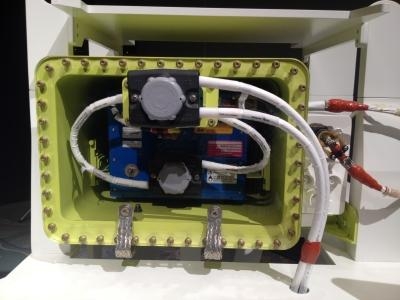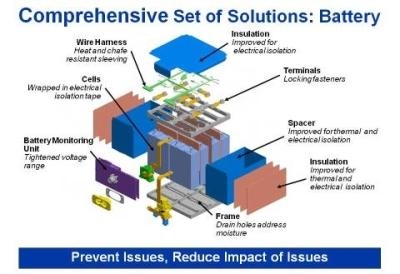Fri, Apr 19, 2013
Instructions To Operators To Be Released Next Week
The FAA has taken the next step in returning the Boeing 787 to flight by approving Boeing's design for modifications to the 787 battery system. The changes are designed to address risks at the battery cell level, the battery level and the aircraft level.

Next week, the FAA will issue instructions to operators for making changes to the aircraft and will publish in the Federal Register the final directive that will allow the 787 to return to service with the battery system modifications. The directive will take effect upon publication. The FAA will require airlines that operate the 787 to install containment and venting systems for the main and auxiliary system batteries, and to replace the batteries and their chargers with modified components.
“Safety of the traveling public is our number one priority. These changes to the 787 battery will ensure the safety of the aircraft and its passengers,” said Transportation Secretary Ray LaHood.
“A team of FAA certification specialists observed rigorous tests we required Boeing to perform and devoted weeks to reviewing detailed analysis of the design changes to reach this decision,” said FAA Administrator Michael Huerta.
To assure proper installation of the new design, the FAA will closely monitor modifications of the aircraft in the U.S. fleet. The FAA will stage teams of inspectors at the modification locations. Any return to service of the modified 787 will only take place after the FAA accepts the work.
As the certifying authority, the FAA will continue to support other authorities around the world as they finalize their own acceptance procedures.

Meanwhile, the French news service AFP reports that, according to a report in Japan's Nikkei Business Daily, that country plans to impose stricter safety requirements on the Dreamliner than will be recommended by the FAA. The paper reports that the Japanese transport ministry will require such things as remote monitoring of battery data, like voltage, and will also require more frequent battery inspections. The current requirement is once every two years.
The ministry is reportedly planning to impose those more stringent measures to address concerns about the airplane's safety on the part of the flying public.
The NTSB will hold a two-day investigative hearing into the Jan. 7 Boeing 787 battery fire on April 23-24 in the NTSB’s Board Room and Conference Center Washington, D.C. The hearing will start at 9 a.m. on both days.
Representatives of the FAA, Boeing, GS-Yuasa and Thales will testify and answer questions from NTSB Board members and technical staff about the design, testing, certification and operation of the lithium-ion battery on the Boeing 787 and the battery fire incident.
(NTSB images)
More News
Pilot Applied Full Aft Stick And Nose-Up Trim, But The Airplane Remained On The Runway Analysis: The pilot reported that a preflight inspection and flight control checks revealed n>[...]
A Few Questions AND Answers To Help You Get MORE Out of ANN! 1) I forgot my password. How do I find it? 1) Easy... click here and give us your e-mail address--we'll send it to you >[...]
From 2022 (YouTube Edition): Before They’re All Gone... Humankind has been messing about in airplanes for almost 120-years. In that time, thousands of aircraft representing i>[...]
Advanced Air Mobility (AAM) A transportation system that transports people and property by air between two points in the NAS using aircraft with advanced technologies, including el>[...]
Aero Linx: MQ-1B Predator The MQ-1B Predator is an armed, multi-mission, medium-altitude, long-endurance remotely piloted aircraft that is employed primarily as an intelligence-col>[...]
 NTSB Final Report: Douglas A-4K
NTSB Final Report: Douglas A-4K ANN FAQ: Q&A 101
ANN FAQ: Q&A 101 Classic Aero-TV: PBY Catalina--From Wartime to Double Sunrise to the Long Sunset
Classic Aero-TV: PBY Catalina--From Wartime to Double Sunrise to the Long Sunset ANN's Daily Aero-Term (07.01.25): Advanced Air Mobility (AAM)
ANN's Daily Aero-Term (07.01.25): Advanced Air Mobility (AAM) ANN's Daily Aero-Linx (07.01.25)
ANN's Daily Aero-Linx (07.01.25)




